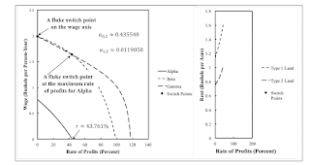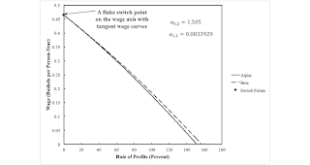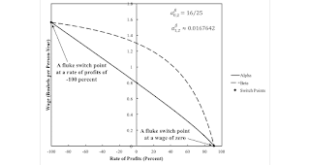I am thinking about my work of fluke switch points. Here are some possibilities, some of which are more of a stretch: Bulletin of Political Economy Cahiers D'Économie Politique Cambridge Journal of Economics Capital & Class Challenge Contributions to Political Economy Economic Systems Research Metroeconomica Review of International Political Economy Review of Political Economy Review of Radical Political Economics Science and Society Structural Change and...
Read More »Marx’s Theory Of Value
[embedded content]Victor Margariño explains labor theory of value to Vaush Marx sets his theory of value within the capitalist (or bourgeois) mode of production: "The wealth of those societies in which the capitalist mode of production prevails, presents itself as 'an immense accumulation of commodities'..." (Marx 2010, first sentence of chapter 1) Feudal societies, with lords and serfs, and classical societies, such as the Roman empire with its slaves, present other modes of...
Read More »Fluke Switch Points
Exploring perturbations of four examples of fluke switch points provides a brief survey of some aspects of prices of production. The examples arise in, respectively, models of circulating capital, fixed capital, extensive rent, and intensive rent. The reverse substitution of labor, reswitching, and capital reversing, for example, are contrasted with genuine fluke cases. These posts present examples of fluke switch points. Each example is of a fluke case in at least two ways. Either two...
Read More »The Emergence Of Multiple Cost-Minimizing Techniques
Figure 1: Wage Curves and Rent for an Example of Intensive Rent This post is a rewrite of this. The analysis of the choice of technique, in my previous three posts in this series, has always been based on the construction of a wage-rate of profits frontier. Given a technology in which requirements for use can be satisfied, prices of production for a feasible technique, including the wage, are uniquely determined by the given rate of profits. If the rate of profits is in a range where such...
Read More »An Extensive Rent Example
Figure 1: A Wage Curves and Rent for an Example of Extensive Rent This post is a rewrite of this. It is the third in a series, with the first here and the second here. The analysis of the choice of technique in models of extensive rent can be based on the construction of wage curves, even though the outer envelope does not represent the cost-minimizing technique. The orders of fertility and rentability are emphasized here. The order of fertility is defined for specified techniques, in...
Read More »Fixed Capital And The Emergence Of Reswitching
Figure 1: A Wage Frontier With A Fluke Switch Point This post is a rewrite of this, without the attempt to draw a connection to structural economic dynamics. This is the second post in a series, starting with this. A fluke example with fixed capital illustrates the emergence of the reswitching of techniques. Table 1 presents coefficients of production in a perturbation of an example from Schefold (1980). With the first process, workers, under the direction of mangers of firms, manufacture...
Read More »The Emergence Of The Reverse Substitution Of Labor
Figure 1: A Wage Frontier With Two Fluke Switch Points This post is a rewrite of this, without the attempt to draw a connection to structural economic dynamics. This post presents an example with circulating capital alone. Table 1 presents the technology for an economy in which two commodities, iron and corn, are produced. Managers of firms know of one process for producing iron and two for producing corn. Each process is specified by coefficients of production, that is, the required...
Read More »Scholarly Socialists During The Second International
Socialism became a mass movement in many European countries about the time of the heyday of the Second International. Many leaders of these movements and those struggling for leadership produced works of scholarship, albeit often with an activist spirit. I think of, for example: Eduard Bernstein. The Preconditions of Socialism and the Tasks for Social Democracy. Nikolai Bukharin. The Economic Theory of the Leisure Class. Richard B. Day and Daniel F. Guido (eds.). 2018. Responses to...
Read More »Events Without Probability
1.0 Introduction In a common model, probability theory assigns a number between zero and one to events. But some events cannot be assigned a probability, even zero. Nobody understands probability, in some sense. This post is not about economics, although these ideas do have an application in mainstream economics. It is not at all novel. This is one of my favorite proofs in all of math, typically taught sometimes after an introductory mathematical analysis class. My undergraduate class in...
Read More »External Influences On Academic Economics?
1.0 Introduction A question has arisen elsewhere. Why, except for an interlude during the post war golden age, has a nineteenth century orthodoxy dominated economics departments and treasury departments around the world? Here I do not investigate the details of this orthodoxy or if it does dominate. 2.0 An Authoritarian Point of View Some people believe that some are better than others. They want to live in a world where those at the top tell those below what to do, and those below jump....
Read More » Robert Vienneau: Thoughts Economics
Robert Vienneau: Thoughts Economics




